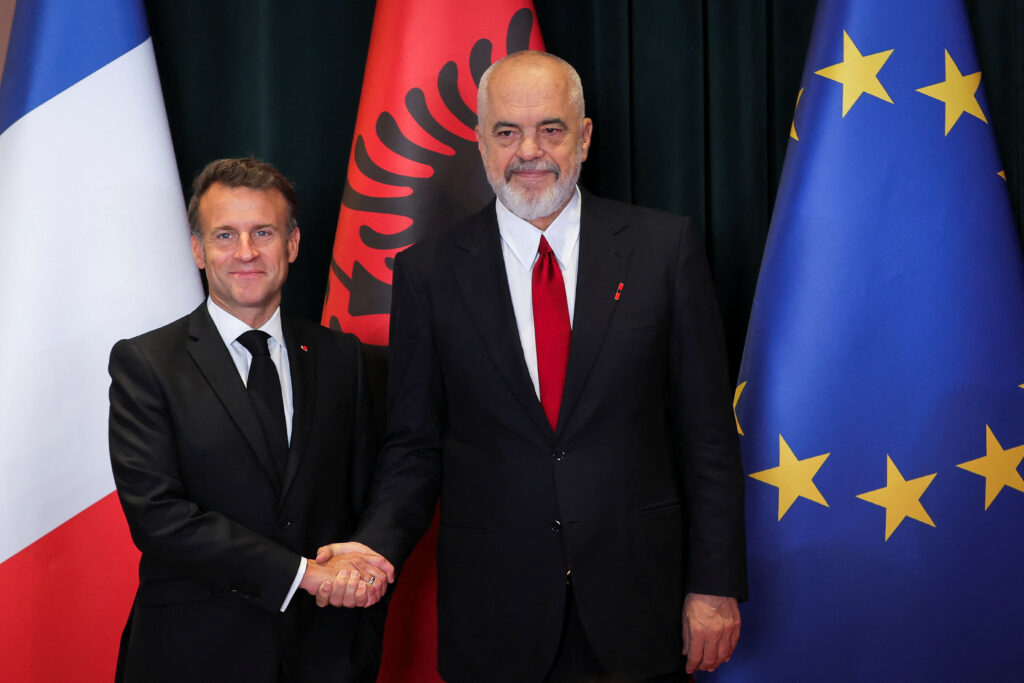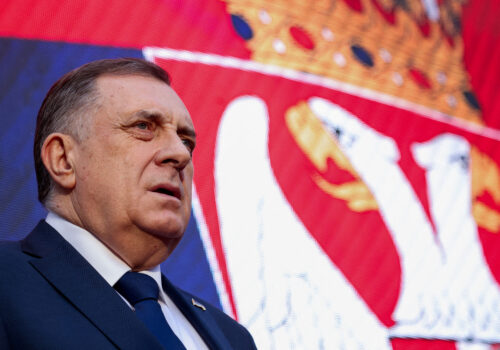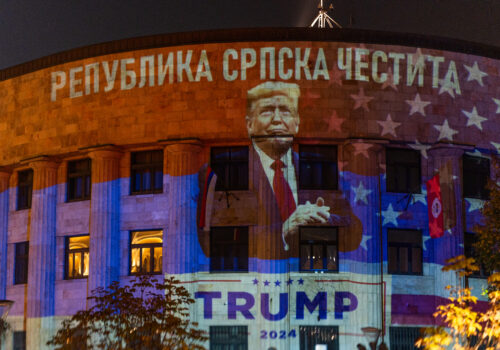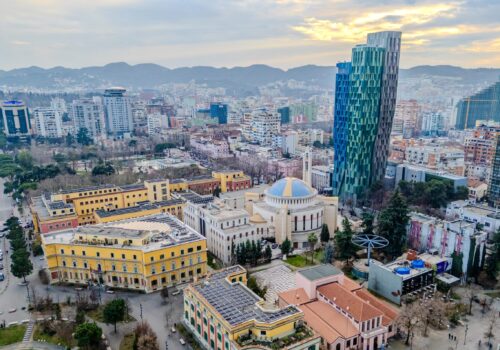
July 1 will mark a dozen years since Croatia joined the the European Union (EU), the most recent country to do so. In the years after Croatia’s accession, the bloc’s eastern enlargement process stalled almost entirely. The EU’s enthusiasm for admitting new members waned, driven by rising anti-EU sentiment within member states and fears that further expansion could strain the bloc’s already burdened consensus-based decision-making. Meanwhile, democratic backsliding and disputes between candidate countries further undermined their cases for accession.
Then in 2022, Russia’s full-scale invasion of Ukraine revived the geopolitical imperative for enlargement in Brussels by highlighting Europe’s vulnerability to “gray zones.” Ukraine, Moldova, and Georgia swiftly advanced along their accession paths, and hopes were somewhat revived in the six countries of the Western Balkans.
While Montenegro is the most advanced in accession negotiations today, Albania is also capitalizing on this new enlargement momentum. On May 11, Albania held parliamentary elections in which the Socialist Party, led by Prime Minister Edi Rama, won its fourth consecutive mandate, promising EU membership by 2030. After gaining EU candidate status in 2013 and waiting over a decade for the next formal step, Albania and the EU have been on an unprecedented roll since October 2024. Over the span of several months, the EU opened four clusters of negotiation chapters with Albania—covering twenty-four out of thirty-three chapters—and may open the remaining ones by the end of June. The opening of chapters signals that Albania has met initial EU benchmarks in those policy areas and will now negotiate to close the chapters—which aim to align Albanian laws, institutions, and practices with EU law.
The prevailing narrative among EU leaders, including European Council President António Costa, is that Albania and Montenegro are now leading the race to become the EU’s next member states. Both Albanian and EU officials have set 2027 as the target year to conclude the technical accession talks, paving the way for a membership vote. In May, that ambitious goal received a boost from French President Emmanuel Macron—once a skeptic of enlargement—who called it “realistic” during a visit to Tirana.
Albania is moving fast, but will face headwinds
Several factors explain why Albania and Montenegro are pulling ahead of everyone else. To begin with, both are NATO members and—unlike Russia-friendly Serbia—are fully aligned with the EU’s Common and Foreign Security Policy. Albania, in particular, is seen as a reliable pro-Western security anchor in a volatile region where ethnic Albanians dominate in neighboring Kosovo and are a politically significant bloc in NATO members North Macedonia and Montenegro. Unlike Kosovo, which remains unrecognized by five EU member states, and North Macedonia, which is blocked by Bulgaria over historical disputes, Albania faces no such bilateral hurdles to its accession path from EU members—aside from intermittent tensions with neighboring Greece over ethnic Greek property rights and maritime borders.
Yet perhaps the main driver of Albania’s recent progress has been its sweeping EU- and US-sponsored reforms in the justice sector. Over nearly a decade, Albania has overhauled its judicial institutions and established new bodies, such as the Special Structure Against Corruption and Organised Crime (SPAK). While corruption remains high, the reformed institutions have shaken the culture of impunity that has plagued the country since the fall of communism. High-profile indictments—ranging from former presidents and prime ministers to powerful mayors—have started to build a credible track record in the fight against corruption and are helping to restore public trust in the rule of law. Yet SPAK’s results need to be sustained, and political commitment to the rule of law will increasingly be tested the deeper that investigations go.
Albania’s democracy also remains fragile and polarized. While the most recent parliamentary elections improved on earlier contests from an administrative standpoint, the political playing field continues to be uneven in favor of the ruling party. Corruption, the stifling effect of politics on media freedoms, the strength of organized crime, and weak administrative capacity—all persistent problems—could hinder the adoption of EU standards.
Most importantly, the geopolitical mood in European capitals could easily shift away from its current support for enlargement. While Rama has secured strong political backing from major countries such as France and Italy, it is not clear whether it will receive support from the new government in Germany, which is not striking equally enthusiastic tones. The German government’s coalition agreement ties enlargement to necessary internal EU institutional reforms, which means that the EU must first ensure it can operate effectively before allowing other countries in. German Chancellor Friedrich Merz and his Christian Democrats seem to favor intermediate integration models—such as having the Western Balkans join the European Economic Area, or layering the EU into concentric circles of states with varying degrees of integration.
What’s more, getting EU governments to support accession is one thing; getting the support of EU members’ parliaments to ratify accession is another. European public opinion remains wary of enlargement in several countries.
Race to the top
The prospect of Albania and Montenegro joining the EU ahead of their neighbors also raises pressing regional questions. With the rapid pace at which Albania is opening negotiation chapters, it has effectively leapfrogged over the region’s largest country, Serbia, whose accession talks have remained frozen since 2021.
For the Western Balkans, EU enlargement has functioned not only as a tool for political transformation but also for peacebuilding. The EU has long pursued a strategy of integrating the region as a group, using accession as leverage to foster regional stability, set up bilateral formats to resolve bilateral disputes—such as the Kosovo–Serbia dialogue on normalization of relations—and promote cooperation through initiatives like the Common Regional Market.
Critics may warn that Albania and Montenegro advancing alone could reinforce Serbia’s narrative of marginalization, fuel anti-EU sentiment, and undermine frameworks for regional cooperation—especially given Serbia’s pivotal role and the size of its population. But the long-standing Serbia-centric approach to enlargement—which posits that the region cannot move forward without accommodating Serbia due to its power and influence over other countries—has not worked. Rather, it has merely emboldened Serbian President Aleksandar Vučić to wield even greater de facto veto power and leverage over regional countries and their EU trajectory, even as he slips deeper into authoritarianism, sustains close ties with Russia, and has helped erode support for EU accession among Serbians.
The EU—and Serbia itself—might be better served by fostering a merit-based “race to the top” that either rewards or fails Montenegro and Albania depending on how they deliver on reforms. Demonstrating that EU enlargement remains a real and attainable goal could create the kind of positive societal pressure the region has desperately needed and could incentivize other EU candidate countries to seize this historic window of opportunity by embracing an agenda of reforms.
Agon Maliqi is a nonresident senior fellow with the Atlantic Council’s Europe Center. He is a political and foreign policy analyst from Pristina, Kosovo.
***
The Western Balkans stands at the nexus of many of Europe’s critical challenges. Some, if not all, of the countries of the region may soon join the European Union and shape the bloc’s ability to become a more effective geopolitical player. At the same time, longstanding disputes in the region, coupled with institutional weaknesses, will continue to pose problems and present a security vulnerability for NATO that could be exploited by Russia or China. The region is also a transit route for westward migration, a source of critical raw materials, and an important node in energy and trade routes. The BalkansForward column will explore the key strategic dynamics in the region and how they intersect with broader European and transatlantic goals.
Further reading
Wed, Apr 23, 2025
What’s at stake for Bosnia and Herzegovina as Milorad Dodik faces a political reckoning?
New Atlanticist By Agon Maliqi
With his secessionist threats seemingly at a dead end, Milorad Dodik’s external backers might view him as more of a liability than an asset.
Fri, Mar 7, 2025
What Trump’s approach to Europe means for the Western Balkans
New Atlanticist By
Shifts in US policy toward Europe could prompt the EU to step up on security for the Western Balkans and revive the enlargement process.
Wed, May 7, 2025
Your primer on Albania’s parliamentary election
Eye on Europe's elections By
In the lead-up to Albania's parliamentary election on May 11, experts from the Europe Center unpack the key players, issues, and dynamics shaping this weekend’s election.
Image: France's President Emmanuel Macron is welcomed by Albania's Prime Minister Edi Rama in Tirana, Albania May 17, 2025. REUTERS/Valdrin Xhemaj.



